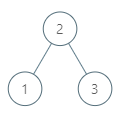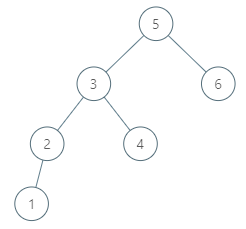Given the root of a binary search tree and a node p in it, return the in-order successor of that node in the BST. If the given node has no in-order successor in the tree, return null.
The successor of a node p is the node with the smallest key greater than p.val.
Example 1:
Input: root = [2,1,3], p = 1 Output: 2 Explanation: 1's in-order successor node is 2. Note that both p and the return value is of TreeNode type.
Example 2:
Input: root = [5,3,6,2,4,null,null,1], p = 6
Output: null
Explanation: There is no in-order successor of the current node, so the answer is null.
Constraints:
- The number of nodes in the tree is in the range
[1, 104]. -105 <= Node.val <= 105- All Nodes will have unique values.
/**
* Definition for a binary tree node.
* function TreeNode(val) {
* this.val = val;
* this.left = this.right = null;
* }
*/
/**
* @param {TreeNode} root
* @param {TreeNode} p
* @return {TreeNode}
*/
var inorderSuccessor = function (root, p) {
function findMin(root) {
if (!root) {
return null;
}
while (root.left) {
root = root.left;
}
return root;
}
if (!root) {
return null;
}
let successor = null;
while (root) {
if (root.val > p.val) {
successor = root;
root = root.left;
} else if (root.val < p.val) {
root = root.right;
} else {
if (root.right) {
successor = findMin(root.right);
}
break;
}
}
return successor;
};

